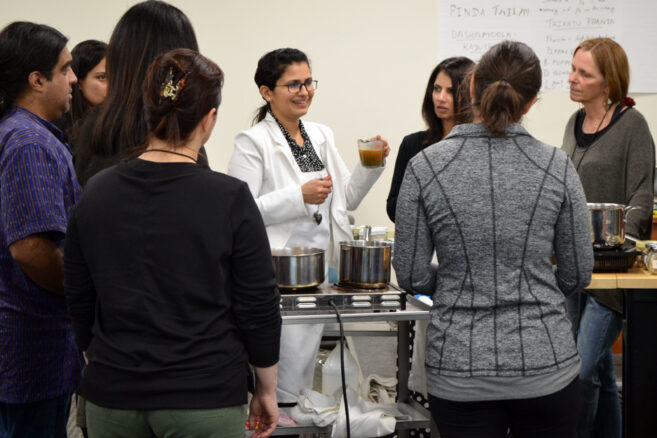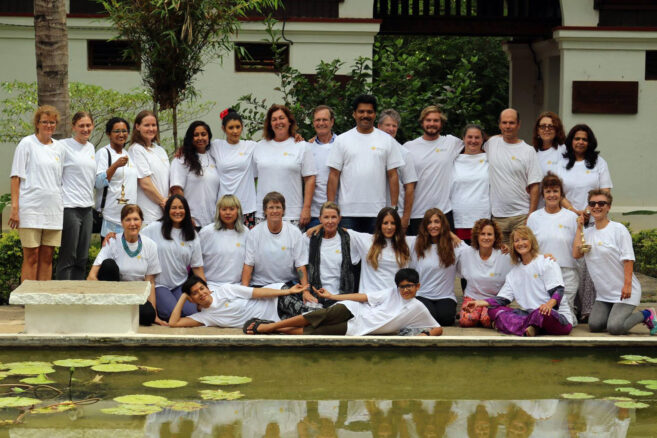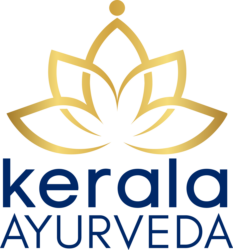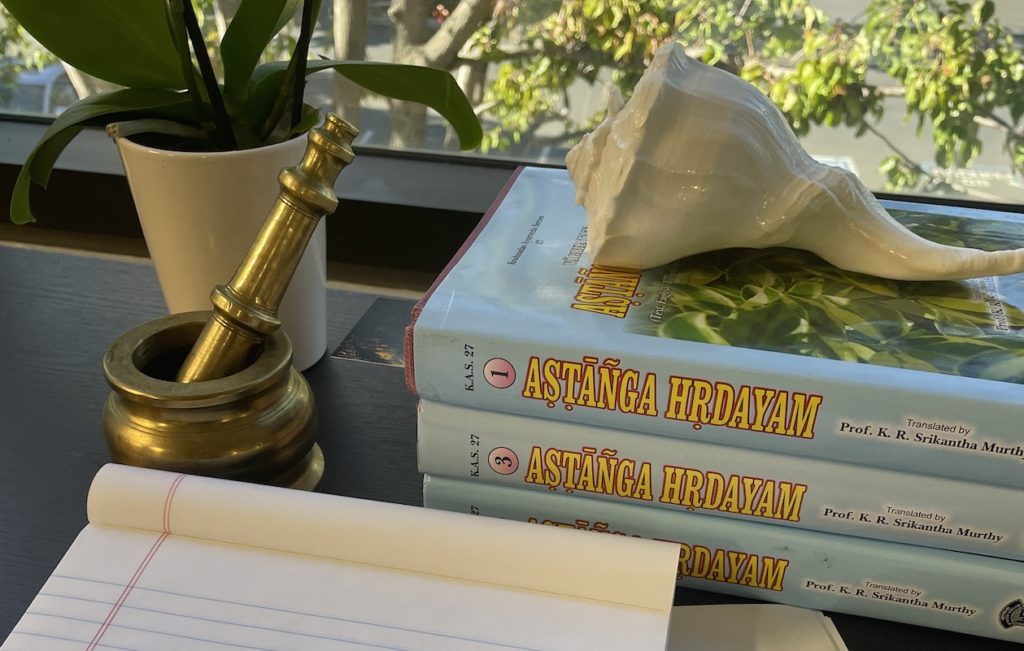Have you been called to study Ayurveda? Being a healer is one of the most important dharmas, or purposes in life. It is an opportunity to serve your community and the world by helping others find health, happiness, and longevity. Fulfilling such an important dharma requires seeking the right Ayurvedic certification program. And while it can be an exciting and emotional process, it can also be a bit stressful as you strive to make the best decision.
In ancient times, Ayurveda was taught based on the “Gurukula” system of education. This system required that the teacher (guru) hand-select each student based on their personal readiness in mind, body and consciousness. The guru and students lived together for the duration of the learning process. Today, learning Ayurveda is a bit different. With programs available for purchase and Google at your fingertips, you can search to find many offerings, schools, and certifications. But how do you find the one that works for your needs, budget, and heart? This blog will guide you through the process of selecting an Ayurvedic certification program that will fit your needs and help you achieve your highest dharma: becoming a healer.

Establish your goals
Setting goals helps you to identify a list of criteria for school selection and can be developed by examining your purpose for study and what you want to achieve with your Ayurvedic program.
Some examples of goals are:
- Improve your own health
- Enhance or build upon your current career
- Change careers or start a new business
- Learn a new skill
- Gain knowledge for fun
- Become certified by a nationally recognized organization (National Ayurvedic Medical Association or NAMA)
Don’t skip the goal-setting exercise! It will help you to prioritize your selection criteria and ensure your program has all the content, skills, and attributes needed to support your desired outcome.
Define your criteria
Prerequisites
Investigate any requirements or prerequisites needed prior to program registration. Do they need to be 100% completed to be accepted in the program or may you fulfill them any time prior to your graduation from the program? Frequent requirements include items such as fluency in English and High School or GED completion. Higher-level certifications may also require a set number of credits in Anatomy and Physiology.
Program format, schedule, and location
Ayurvedic certification programs come in many shapes and sizes. They can be online (live streamed or recorded), in person, or a combination of both. Are you disciplined enough to self-guide your progress through a recorded program, or do you learn best directly in front of the teacher in a classroom setting? Do the classes require daytime, evening, or weekend attendance, and will they fit into your work, family life, and other commitments?
Physical location may or may not be a consideration depending on the format of the program you are pursuing. If you are pursuing a NAMA-approved program, there will be a mandatory number of hours for which in-person attendance is required. Is the location of the school within an acceptable travel range to allow you to attend in-person classes and internships? Does it allow for easy access to an airport, hotels, restaurants, public transportation, and other amenities?


Evaluating program content
Referring to your goals, do the modules and lectures offered in the program match up to your objectives? For example, are you a yoga instructor wanting to enhance your current studio offerings by including dosha-specific class formats? Are you a massage therapist wanting to learn more about the additional services Ayurveda could bring to your business, such as bodywork therapies? Or are you focusing on your own health and desire a program that will provide you with a toolkit for selfcare?
Program content is not just about the modules and the lectures. Considerations for the content include:
- Real-life experiences and training are very important as well. Will the program give you the hands-on clinical experience needed to gain confidence in healing yourself and others?
- What types of internships and clinical evaluations are offered and are they offered frequently enough for you to gain adequate experience?
- Are the assignments and projects “busy work” or do they serve a deeper learning purpose? Do they connect you with your community and help you share Ayurvedic knowledge and potentially find new clients?
Program length and hours
Our Ayurvedic certification programs begin at the Coach level, and progress all the way to the Doctor level, each program building upon the others. Program lengths range from six months (300 hours) to several years (2600 hours). Whether you choose our programs or another school’s, consideration should be given to the time frame in which you would like to graduate, your ability to commit to the length of the program, your desire for NAMA certification, and the scope of practice you wish to perform.
Examples of program terms and lengths based on our roster include:
- Holistic Health Coach – 6 months – 300 hours
- Ayurvedic Health Counselor – 1 year – 600 hours
- Ayurvedic Practitioner – 1.5 years – 900 hours
- Ayurvedic Doctor – 3 years – 2,700 hours
Total hours may differ amongst schools. While NAMA certification requirements stipulate the minimum hours required for a program, schools can include more hours at their discretion. Programs that are not NAMA-approved may align with the hours to remain competitive, but they aren’t required to have them.
Tuition
One of the major considerations in selecting an Ayurvedic certification program is of course the level of financial investment required to complete the program. Just like the hours and length of programs vary, so do tuition rates. Explore your school’s payment options.
Tuition considerations:
- Do they offer discounts for payment in full, early registration, etc.?
- Are payment plans available and/or scholarships?
- Are there additional costs, e.g. fees for books, materials, registration, application fees and internships?
- If travel is required for in-person requirements don’t forget to factor in travel expenses.
Accreditation
Currently, the practice of Ayurveda is not licensed in the United States nor is it regulated by state or federal agencies. Standards of Ayurvedic competency are set by individual schools and organizations like NAMA (National Ayurvedic Medical Association). State educational bureaus like BPPE (Bureau for Post-secondary Professional Education) may govern a school’s operational status and general program deliverability. While accreditation is not required for completion of an Ayurvedic certification program, selecting an accredited school can bring assurance that the program has undergone review to ensure content, hours and encounters are appropriate for the program.


Faculty and Support Staff
“Better than a thousand days of diligent study is one day with a great teacher”
-Japanese Proverb
Explore the credentials of an Ayurvedic certification program’s faculty. Faculty credentials are variable. We include some explanations of what they mean below.
Faculty considerations include:
- Are the teachers Vaidyas (Ayurvedic physicians coming from a lineage of Ayurvedic healers)?
- Do their education credentials include BAMS (Bachelor of Ayurvedic Medicine and Surgery – India), BSc (Bachelor of Science – India) and/or AD (Ayurvedic Doctor – U.S.)? These are the highest levels of study.
- Does the school’s faculty have clinical experience practicing Ayurveda, and how much?
Student services are also important. In addition to faculty, take time to evaluate the student support services offered by the school.
Student support considerations:
- Are student mentors available and accessible to answer your questions and guide you through your projects and assignments?
- Do the admissions staff take time to understand your goals, consider your needs and recommend appropriate programs and payment options?
- Are there any student and alumni benefits?
Trust your feeling
Lastly, take notice of how you feel about the overall vibe of the prospective school. Each school has a unique energy and culture, and some may be a match, while others are not. It’s nothing personal!
- Do your interactions leave you with a feeling of community, family, and belonging?
- Are those you interact with genuine, caring, and compassionate?
- Do you sense a dedication to the school, students, and the study of Ayurveda?




Take notes as you research
To help you on your search for the perfect school, we created a free, downloadable guide you can fill in and use as you compare the beginner Ayurvedic certification programs you consider. We have done the legwork for you and filled in the details for our Coach and Counselor programs in the guide.
*By downloading this guide, you agree to receive emails from Kerala Ayurveda USA. You can unsubscribe at any time.




Ayurvedic study is a beautiful journey. We congratulate you on taking these first steps in the pursuit of your Ayurvedic education and we wish you much success with your studies!






